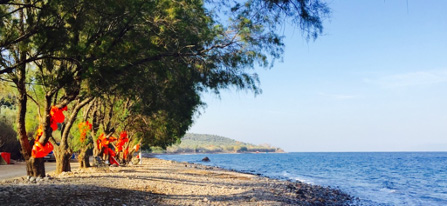Posts Tagged ‘United Nations High Commission on Refugees’
Refugees: The Great Walk Now or Never
The black rubber dinghy had just landed on Mytileni’s rocky beach on the Isle of Lesvos, Greece. The 41 people crammed precariously on the raft quickly dropped their orange life jackets and looked around to make sure their friends and relatives had also made it to land.
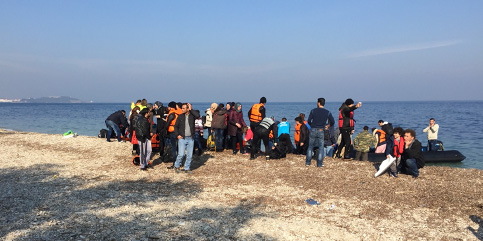
A father knelt before his curly headed son, around 3 years old, took off his life jacket, checked his clothing—damp, but not too wet—and tried to explain where they were. The boy smiled, looked about and then spent his time trying to get his heel back into one of his wet sneakers. I was able to help him as his father looked for his wife, who’d made it to land further down the beach. The family had left Aleppo a week ago, waited three days on the Turkish coast near Izmir for transport and now, finally had safely reached the shores of Europe.
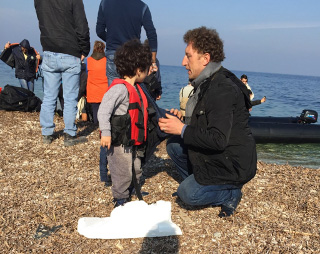
From here they would continue their long journey to a new life, which they hoped would be in Germany. Before them lay at least half a dozen train and bus rides and walks with their two backpacks containing all their belongings. Also ahead were multiple registration centers in each country they would pass through.
Along with the 760,000 people who have come through Greece since April, they were embarking on “The Great Walk,” or some call the trek “The Great Wait.” With winter coming and borders closing, it is a “now-or-never” journey as Europe absorbs the largest migration since World War II. Almost half—45%—come through Lesvos, 58% men, 16% women, 26% children, according to statistics from the United Nations High Commission on Refugees (UNHCR).
As Syrians, they are lucky, if having to flee one’s home destroyed in war can be considered luck. Most Syrian refugees—96-98%—will eventually find new residencies. Syrians comprise 45% of this great exodus. Another third are Afghan, a tenth are Iraqi. The rest are Eritrean, Central African Republic, Iranian, Somalians, Moroccan, Algerians and others, according to figures from UNHCR. The latter four nationalities have slim chances to resettle in Europe.
In the past month access for “direct arrivals” has closed. Only refugees from Syria, Iraq and Afghanistan are allowed the onward journey into Europe. These nationalities comprise 85% of those on the move. The rest are turned back. The European Union has also agreed to accept 160,000 in a formal resettlement process, which takes one to two months and requires refugees to accept whatever country they are assigned. Again, only certain nationalities are included in this relocation process—Syrians, Iraqis, Eritreans, those from the Central African Republic and perhaps soon Afghans, according to Alessandra Morelli, UNHCR Senior Operations Coordinator in Greece.
“History is passing in front of our eyes,” Ms. Morelli says at the UNHCR office in Athens. “I feel responsible that we build a Europe that is open and not one of walls.”
In the Lesvos registration site Kara Tepe I met with a group of 21 family and friends who’d arrived earlier in the day. They had come through Lebanon from their village and were part of a small Shia sect of the Alawites. The Assad forces had insisted the men must join the Army at the same time ISIS had come to the village and kidnapped three girls and killed many people and threatened that if the men didn’t join them and convert, they would be killed.
They fled the village, leaving behind a 65-year old father, a lawyer who’d been imprisoned and tortured and didn’t want to leave. Another woman through tears said her 19-year old son was still in Turkey trying to raise money to cross. She would stay on Lesvos until he joined her. Among their group were infants and toddlers, who were now running in and out of the small Ikea houses assigned to the families until they moved on later in the day or the next day.
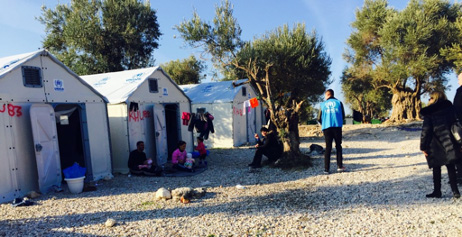
“I fled not as a deserter, but because I didn’t want to fight,” said one of the fathers. “It was impossible to live in Syria any longer with our family. We needed $12/day to live and could only make $2. I was working in a restaurant; my wife studied French in university and couldn’t find a job. For the last three years there have been no jobs. There was constant shelling. Our children were afraid. There was no future for them, and we are watched on all sides. Planes are constantly flying over; the children aren’t sleeping; shooting is everywhere. When it’s dark, no one goes out.
“But despite all the difficulties we still face, we feel safe now,” he added. “We’ve received good treatment here, enough to feel like human beings again. I want my children to be raised in Europe out of all the bad complexities in my part of the world.”
Harsh stories abound for each refugee, but there are also stories of hope and of an outpouring of good will along the way. Volunteers from Greece and all over Europe have come to assist. There are Doctors Without Borders treating the sick, Clowns Without Borders entertaining the children; there are Families Like Ours from Portugal providing tons of clothes, Green Helmets from Germany putting in wooden floors in the tents, Samaritans are winterizing the shelters with tarps. There is a local Greek mother who donated a stroller and wrote a letter to the mother who would receive it. There are Spanish Life Guards who wait on the beaches in wet suits, ready to go out into the ocean to help those trying to get to shore.
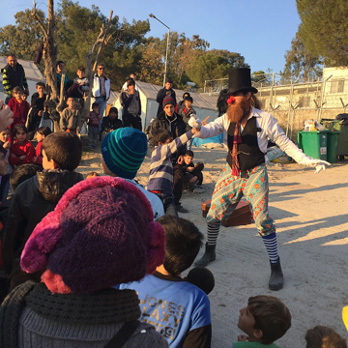
There are local and international nongovernmental organizations—Save the Children, Action Aid, Habitat for Humanity, International Rescue Committee, Red Cross, etc., all taking up specific roles in this migration. There are agencies of the European Union, providing security and registration.
Since early fall the United Nations High Commission on Refugees has been on the ground helping coordinate all these processes. The priorities for the refugees are employment and education for their children.
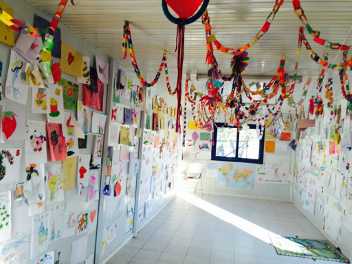
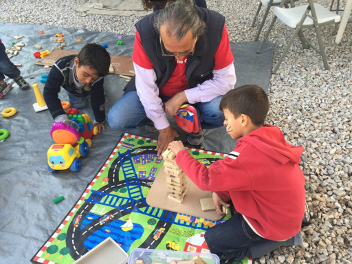
Their journeys, with variations, look like this: They arrive from Syria into one of the bordering countries—Iraq, Jordon, Lebanon or Turkey. There they likely find a smuggler, pay the fee, wait on the border for their turn, sometimes a wait of several days. From Turkey, they climb on a raft, often at night so they are less likely to be seen, and they take the 4-6 mile trip of 2-4 hours, depending on conditions. Shipwrecks and drowning are real dangers and have taken the lives of hundreds, six Afghans just in the time I was there.
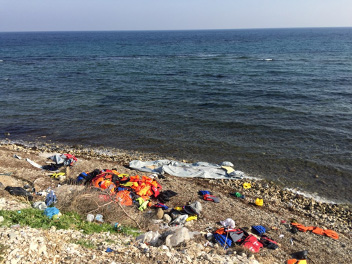
On the beach they are met by volunteers and usually by representatives of the EU or UNHCR and the Greek municipality, who take them to a first staging area, where they are given food, water, the opportunity to shower, charge their phones, and change into dry clothes if needed. They are then put on a bus and taken to the registration centers, where their papers are checked; they are finger printed; their nationalities are sorted out; they are given official registration documents and advised on possible next steps. This process can take 2-8 hours. They have the option of staying the night in a tent or small Ikea house for families.

From the registration center they continue to Athens on a ferry. This they must pay for. Their registration and documents are again checked, and they board buses to Idomeni in Northern Greece near the Macedonian border, where, if they are Syrian, Iraqi or Afghan, they are allowed to cross. They walk from the border to a registration site, enter a large tent with wooden benches and wait to be called to register again, this time for Macedonian papers. After registration, they are given food and water, clothes if they need. At all the centers there are safe places and play spaces for women and children, run by Save the Children and other organizations. Over the loud speaker the announcement of all the services available are repeated in English and Arabic, including: “You don’t need to pay for anything.” Everything at the site is free. They wait in tents or in small Ikea houses or outside if the sun is shining for the train to arrive. The train was late the day we were there, and it is not free. It will eventually take them to Serbia, where they must walk to the registration center and again register for new documents. From there they will get trains or buses to their next destinations with walking in between, making their journey northward to Croatia, Slovenia, Hungary, Austria and for many on to Germany or Sweden or other countries.
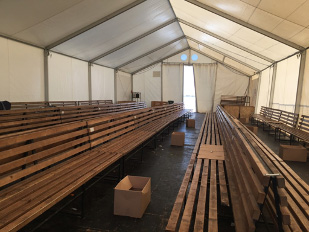
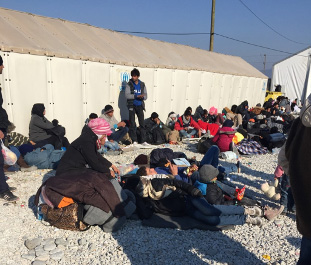
War is at their back. Their future is focused on their children. Their destinations are partly places of imagination, where they imagine jobs and schools and safety. But the triage is intensifying. Winter is coming. The European Union is paying Turkey three billion Euros to secure its borders and service the three million refugees already in Turkey so that they stay. Quotas are filling rapidly in countries like Germany and Sweden, where refugees perceive opportunities. Through facebook and through families who have gone before them, and from the media, Germany and Sweden and Holland and a few other countries have become their mecca, and countries like Portugal, which is open to refugees, have so far received few.
“They are families like us. We want to help,” said Barbara Guevana at the Macedonian border camp. She is one of the founders of Familias Como as Nossas—Families Like Us—a group of women who didn’t know each other but connected through facebook to assist Syrians with housing, education and transportation to Portugal, which has allotted 4500 spaces for refugees. Seventeen women drove three days to Croatia to meet Syrian families, taking with them clothes and food and assuring them Portugal was waiting to welcome them.
“But people don’t know about Portugal,” said Ms. Guevana. “In Arabic the name means ‘Orange,’ and they question why they should go to ‘Orange.’ We assure them we want them to come. The Portuguese government is willing to fly them to Portugal if they get to Austria.”
This migration is changing the face of Europe and challenging the future of the European Union. “We need to manage borders, not close them,” insists Philippe Leclerc, the new UNHCR representative, who has just arrived to head the Greek operation.
While Germans, French and Austrians were at first welcoming, Eastern European nations like Poland, Hungary, Slovakia have been more resistant. And everyone agrees that the November terrorist attacks in Paris have changed attitudes.
“We need to realize these people are fleeing the terrorists; they are not the terrorists,” said Maureen White, board member of the International Rescue Committee and director of Johns Hopkins School of Advanced International Studies Center on Migration and a fellow traveler on this trip.
As the sun sets, we drive from Macedonia through the official checkpoint, showing our passports at each border as we return to Thessalonica. When we cross into Greece, we find our car behind a caravan of busses filled with refugees and migrants who are being returned to Athens. Today was a major police action that cleared the area called “the Green Field” where those not allowed to cross had started camping and piling up. These are not Syrians, Iraqis or Afghans, but all the other nationalities who hoped to pass into Europe. Nineteen hundred people in 49 buses will be put up for the night in the old Olympic facilities in Athens and in the morning told their options, including applying for asylum in Greece, an unlikely outcome, applying for resettlement, an option at the moment only for Syrian, Iraqi, Eritrean and Central Africans or returning to their countries of origin.
